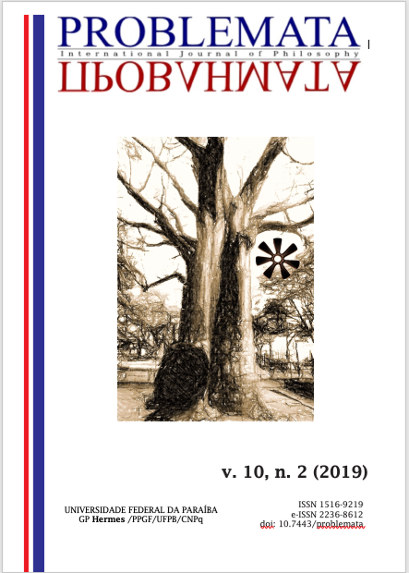"OH MY BODY, MAKE OF ME ALWAYS A MAN WHO QUESTIONS":
ACCOUNT ON AN AFRICAN PHILOSOPHY RESEARCH IN BRAZIL
DOI:
https://doi.org/10.7443/problemata.v10i2.49112Keywords:
Ancestry, Black Body, African Philosophy, Academic ResearchAbstract
This article this is a resumption of the path for the composition of my thesis on African philosophy in order to relate the theoretical influences and challenges scholars found to complete the research. Starting from ripening of thematic and your importance to the Brazilian context, then detailing the epistemic impediments on an academic structure that rules pré-estabelece to legitimize knowledge and, ultimately, bringing some important concepts for the research of African philosophy and its peculiarities depending on the experience of the researcher. With that, the theoretical contributed Gayatri Spivak, Sueli Carneiro, Frantz Fanon and Eduardo Oliveira made it possible to deepen in the themes as subalternity, epistemic racism, black body, epistemicídio and ancestry. Therefore, this report exposes how the production of African philosophy brings the conflict with hegemonic standards expected of an academic research.
Downloads
References
BRASIL. (2004). Diretrizes Curriculares Nacionais para a Educação das Relações Etnicorraciais e para o Ensino de História e Cultura Afro-Brasileira e Africana. Brasília: Ministério da educação.
CABRERA, Julio. (2016a). O estudante de filosofia como “vítima acadêmica”: uma reflexão sobre razão vitimária desde Enrique Dussel e Paulo Carbonari. Apresentação na Mesa Redonda: Filosofia no Brasil: a história da próxima década. IV Congresso de Filosofia de Libertação.
CARNEIRO, Aparecida Sueli. (2005) A construção do Outro como não-ser como fundamento do ser. FEUSP. (Tese de doutorado).
CASTIANO, José P. (2014). Alice Coloquium Closing Session n. 18. ALICE CES. Disponível: https://www.youtube.com/watch?v=SFfWhcZUJZ4 Acessado em 11/05/2019.
CASTRO-GOMEZ, Santiago. (2007). Decolonizar la universidad: La hybris del punto cero y el diálogo de saberes In: ______ (org.) El giro decolonial: reflexiones para una diversidad epistémica más allá del capitalismo global. Bogotá: Siglo del Hombre Editores; Universidad Central, Instituto de Estudios Sociales Contemporáneos y Pontificia Universidad Javeriana, Instituto Pensar.
CUSICANQUI, Silvia Rivera. (2010) Ch’ixinakax utxiwa: una reflexión sobre prácticas y discursos descolonizadores. Buenos Aires: Tinta Limón.
DANTAS, Luís Thiago Freire Dantas. Filosofia desde África: perspectivas descoloniais. 2018. 230 f. Tese (Doutorado em Filosofia) – Setor de Ciências Humanas da Universidade Federal do Paraná, Curitiba, 2018.
DJONGA. Bença. Ladrão. São Paulo: Ceia, 2019.
FANON, Frantz. (2008). Pele Negra, Máscaras Brancas. Tradução de Renato de Silveira. Salvador: EDUFBA.
GLISSANT, Édouard. (2011). Poética da Relação. Tradução de Manuela Mendonça. Porto: Porto Editora.
GONZALEZ, Lélia. (1988). A categoria político-cultural de amefricanidade. In: Tempo Brasileiro. Rio de Janeiro, Nº. 92/93 (jan./jun.) p. 69-82.
KANT, Imanuel. (2001). Crítica da Razão Pura. Tradução de Lisboa: Galouste Kubelkian.
KILOMBA, Grada. (2010) Plantation Memories: Episodes of Everyday Racism. Münster: UNRAST – Verlag.
MALDONADO-TORRES, Nelson. (2008). A topologia do ser e a geopolítica do conhecimento. Modernidade, império e colonialidade. Revista Crítica de Ciências Sociais, 80, Março: 71-114.
MBEMBE, Achille.(2014). Crítica da Razão Negra. Tradução de Marta Lança. Lisboa: Ed. Antígona.
NKRUMAH. Kwame. (1970). Consciencism: philosophy and ideology for de-colonization. Library of Congress.
NOGUERA, Renato. (2015). O ensino de filosofia e a lei 10.639. Rio de Janeiro: Ed. Pallas.
OBENGA, Théophile. (1990). La Philosophie africaine de la période pharaonique. 2780-330 avant notre ère. Paris: Editions L’Harmattan.
OLIVEIRA, Eduardo de. (2007). Filosofia da Ancestralidade: Corpo e Mito na Filosofia da Educação Brasileira. Curitiba: Editora Gráfica Popular, 2007.
SAPIÊNCIA, Rincon. Ponta de Lança. Galanga Livre. São Paulo: Boia Livre Produções, 2017.
SOARES, Elza. O que se cala. Deus é mulher. Rio de Janeiro: DeckDisc, 2018.
SPIVAK, Gayatri C. (1994). Quem reivindica alteridade? In: HOLANDA, Heloísa Buarque de. Tendências e Impasses: o feminismo como crítica da cultura. Tradução de Patrícia Silveira de Farias. Rio de Janeiro: Rocco Editora Ltda.
______. (2000) Foreword: Upon Reading the Companion to Postcolonial Studies. In: SCHWARZ, Henry; RAY, Sangeeta (Orgs.) A Companion to Postcolonial Studies. Oxford: Blackwell
Downloads
Published
Issue
Section
License
Authors who publish with this journal agree to the following terms:
- Authors retain copyright and grant the journal right of first publication with the work simultaneously licensed under a Creative Commons Attribution License that allows others to share the work with an acknowledgement of the work's authorship and initial publication in this journal.
- Authors are able to enter into separate, additional contractual arrangements for the non-exclusive distribution of the journal's published version of the work (e.g., post it to an institutional repository or publish it in a book), with an acknowledgement of its initial publication in this journal.
-
- Authors are permitted and encouraged to post their work online (e.g., in institutional repositories or on their website) prior to and during the submission process, as it can lead to productive exchanges, as well as earlier and greater citation of published work (See The Effect of Open Access).





